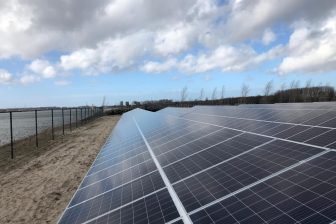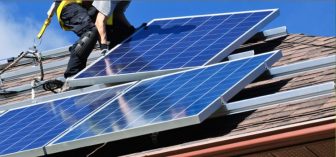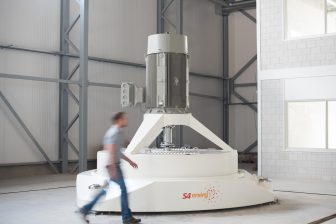EU sluit akkoord over handel in CO2-emissie
7 mei 2015 – Het Europarlement en de Ministerraad kwamen op 6 mei overeen om 1,5 tot 2 miljard emissierechten uit het Europese handelssysteem ETS te onttrekken. Het doel is de prijs te laten stijgen en zo uitstoot te ontmoedigen.
Het Milieucomité van het Europarlement en de Ministerraad tekenden een concept-wet, met de bedoeling de veranderingen per 2019 door te voeren. Het Parlement neemt in juli een formeel besluit.
De ingetrokken rechten komen in een zogenoemde Market Stability Reserve (MSR), een soort reservepot. De Europese Unie kan de prijs van CO2-uitstoot sturen door daar weer rechten uit te halen als dat nodig is.
Uit een persbericht van het Europees Parlement
‘(…) The proposed law would create a system that automatically takes a portion of ETS allowances off the market and into the reserve if the surplus exceeds a certain threshold. In the opposite scenario, allowances could be returned to the market.
“We have struck a good balance between an ambitious and effective reform of the ETS and strong guarantees to ensure that Europe’s energy-intensive industries are not obliged to move their production facilities to countries s outside the EU with less stringent climate policies”, said Ivo Belet (EPP, BE), who is steering the legislation through Parliament.
“The Market Stability Reserve is an efficient, market-driven tool that will stabilise our ETS system, the central pillar of Europe’s sustainability and climate policy”, he added.
“The compromise reached today is satisfactory for all parties. This reform puts the EU in a leading position for the upcoming Climate Conference (COP21) in Paris and enables us to propose concrete plans to achieve the 2030 climate targets” said Environment Committee chair Giovanni La Via (EPP, IT).
Early start in 2019
The Market Stability Reserve would start operating earlier than initially foreseen. The reserve would be established in 2019 – instead of in 2021 as originally proposed by the European Commission.
Backloaded and unallocated allowances
Under Tuesday’s deal, the 900 million “backloaded” allowances would be placed in the reserve, as would the roughly 600 million unallocated allowances (subject to the overall review of the ETS directive), in line with the initial position that MEPs approved in February.
Solidarity allowances for certain member states
MEPs and the Latvian Presidency also agreed that so-called “solidarity allowances”, amounting to 10% of the annual total and allocated to certain EU member states in Central and Eastern Europe, would be exempt from the reserve until 2025.
Innovation fund
To promote low-carbon industrial innovation projects, the European Commission will have to consider, in the context of the upcoming ETS review, whether to establish an “innovation fund” of 50 million allowances.
Next steps
The provisional agreement will have to be confirmed by the EU Council of Ministers’ committee of permanent representatives (COREPER) on 13 May. The Environment Committee would then vote on the agreement on 26 May, followed by Parliament as a whole in July. (…)’
Damien Morris van milieuorganisatie Sandbag ziet het besluit als een ‘landmark’.
Uit een bericht van EurActiv
‘(…) “After a decade of what seemed like terminal decline, this enhanced stability reserve has the potential to inject new life into the carbon market,” he said.(…)’
De organisatie wijst er nu op dat er nog 2,2 miljard emissierechten moeten worden teruggetrokken. Ook andere organisaties zijn positief over het besluit, maar zien het als stap in de goede richting.
De reactie van GroenLinks op haar website
‘(…) Eickhout waarschuwt echter voor teveel optimisme: “Het emissiehandelssysteem bevat meerdere structurele problemen die ervoor zorgen dat er onvoldoende prijsprikkels voor groene innovatie ontstaan.” Een van die structurele problemen is het overvloedig weggeven van gratis emissierechten.
Deze overgebleven structurele problemen zullen aangepakt moeten worden tijdens de grootschalige herziening van ETS die nu van start kan gaan. De Europese Commissie heeft toegezegd met een voorstel te komen. Eickhout: “Het echte gevecht om de CO2-uitstoot daadwerkelijk terug te dringen zal binnenkort dus gaan beginnen.’ (…)’
Uit een bericht van de European Wind Energy Association
‘(…) Ivan Pineda, Director of Public Affairs at the European Wind Energy Association, said: “The start date of 2019 shows that Member States are prepared to compromise. It is also pleasing to see that a substantial number of excess allowances will not be returning to the market and will instead go directly into the reserve.”
He added: “But we have to acknowledge that Member States and the Parliament could have been far more ambitious in the shake-up of the carbon market and that a much more comprehensive reform is needed in order for this instrument to provide a meaningful signal to investors.” (…)’
Uit een reactie van belangenorganisatie voor zakelijke energieafnemers VEMW
‘(…) Algemeen Directeur Hans Grünfeld van VEMW: “dat de milieucommissie van het Parlement overeenstemming heeft bereikt met de milieuministers van de EU-lidstaten over een vervroeging van de introductie van de MSR is niet verbazingwekkend, maar het blijft een noodverband als gevolg van tekortkomingen in het huidige systeem. Voor een blijvende investeringsprikkel is een adequate hervorming van de ETS Richtlijn nodig. Alleen de invoering van de MSR teneinde de prijzen te verhogen helpt niet. Er zal een perspectief op koolstof-efficiënte groei met afdoende carbon leakage bescherming gecreëerd moeten worden om ook na 2020 investeringen in klimaatmaatregelen te stimuleren. Hiervoor is invoering van een dynamisch allocatiemodel noodzakelijk.” (…)’
Bronnen
Europees Parlement, 6 mei 2015: Press Release: ETS market stability reserve: MEPs strike deal with Council
VEMW, 7 mei 2015: Compromis EP over invoering Market Stability Reserve
EurActiv, 7 mei 2015: EU agrees ‘landmark’ carbon market deal
GroenLinks, 6 mei 2015: Uitzicht op reparatie Europees emissiehandelssysteem ETS
EWEA, 6 mei 2015: EWEA welcomes deal on reform of the ETS; carbon reserve in 2019



